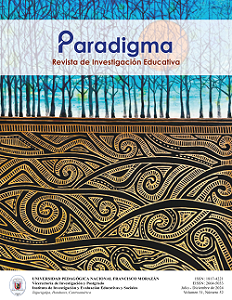Good Living: review of the development model from the educational perspective
DOI:
https://doi.org/10.5377/paradigma.v31i52.19500Keywords:
good living, community development, participation, citizenshipAbstract
This study examines the "Good Living" paradigm as an alternative theoretical framework for social development and its potential application in educational innovation. Starting from a critical review of the evolution of international development models, the research analyzes how these conceptions have historically influenced educational practices and citizen education. The work explores the interrelationship between development models, forms of collective relationships and the construction of knowledge, questioning whether current educational paradigms effectively respond to the contemporary needs of society and the environment. Special attention is paid to the fundamental principles of "Good Living", evaluating their ability to inform and transform pedagogical practices. The main variables include the axioms of "Good Living", international development models, and innovative educational practices. The study seeks to contribute to the dialogue on alternative development models and their application in the educational field, offering new perspectives to address the social and environmental challenges of the 21st century.
Downloads
330
Downloads
Published
How to Cite
Issue
Section
License
Copyright (c) 2024 Universidad Pedagógica Nacional Francisco Morazán

This work is licensed under a Creative Commons Attribution-NonCommercial-NoDerivatives 4.0 International License.
Transfer of Copyright
- The author, when sending the work, states that it is his will to give the Universidad Pedagógica Nacional Francisco Morazán the patrimonial rights that correspond to him as the author of his work.
- The rights here assigned include all economic rights (Reproduction, transformation, public communication and distribution) and are given without limitation in terms of territory; This Assignment is given for the entire duration term established in the current legislation in Honduras.
- The cession of the aforementioned rights does not imply the cession of moral rights over it, because in accordance with the provisions of the Copyright and Related Rights Law, Chapter II, of the Moral Rights, Article 34, Article 25 , these rights are inalienable, imprescriptible, indefeasible and inalienable.
- The research work or document must be original and have been done without violating or usurping rights of third parties, therefore, the work is exclusively authored and owns the same.
- In the case of any claim or action by a third party, as to copyright on the work in question, the author must assume full responsibility for the rights assigned.
- Upon completion of the Rights Assignment Form, the author states that the work has not been published in another way, that the rights on the work have not been assigned and that no encumbrance or limitation on their use or use is imposed on them.








